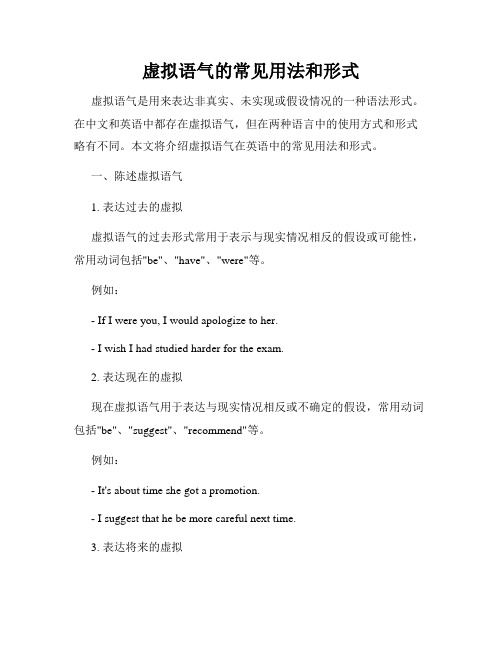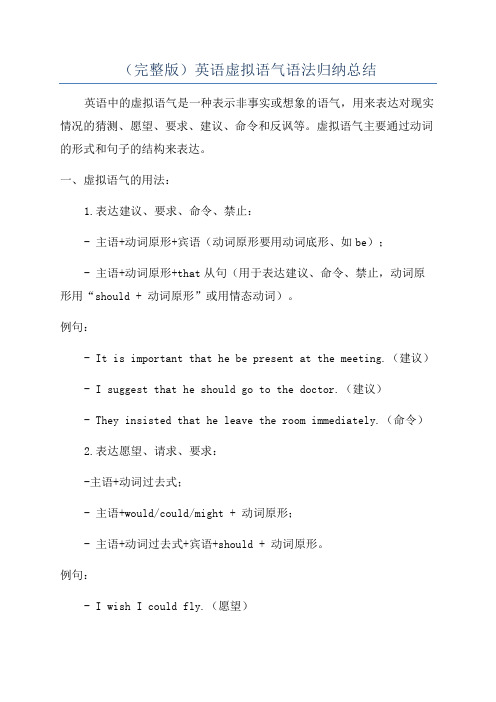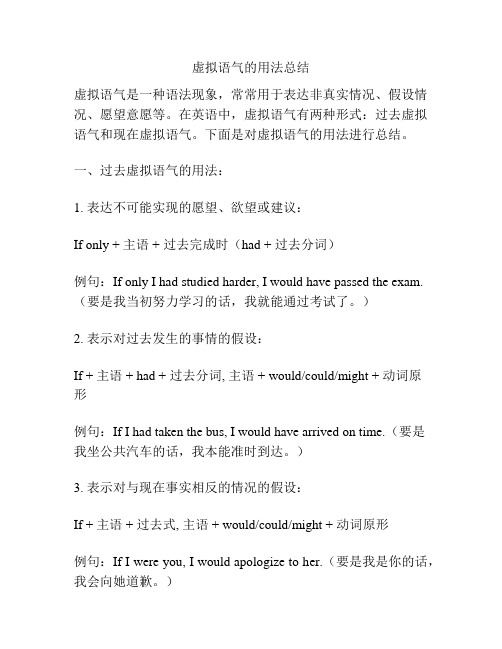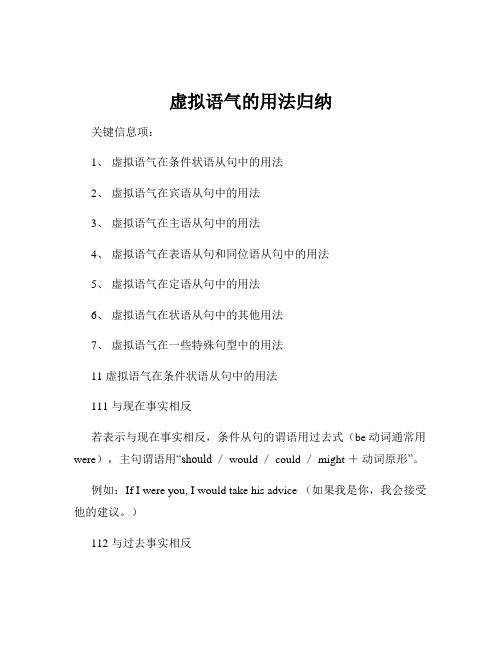虚拟语气用法详解
虚拟语气的常见用法和形式

虚拟语气的常见用法和形式虚拟语气是用来表达非真实、未实现或假设情况的一种语法形式。
在中文和英语中都存在虚拟语气,但在两种语言中的使用方式和形式略有不同。
本文将介绍虚拟语气在英语中的常见用法和形式。
一、陈述虚拟语气1. 表达过去的虚拟虚拟语气的过去形式常用于表示与现实情况相反的假设或可能性,常用动词包括"be"、"have"、"were"等。
例如:- If I were you, I would apologize to her.- I wish I had studied harder for the exam.2. 表达现在的虚拟现在虚拟语气用于表达与现实情况相反或不确定的假设,常用动词包括"be"、"suggest"、"recommend"等。
例如:- It's about time she got a promotion.- I suggest that he be more careful next time.3. 表达将来的虚拟将来虚拟语气用于表达与现实情况相反或不可能实现的假设,常用动词包括"should"、"were to"等。
例如:- If I should win the lottery, I would buy a big house.- If it were to rain, the event would be canceled.二、命令虚拟语气当表示一种命令、建议或要求时,常使用虚拟语气来显得客气或委婉。
例如:- I suggest that you arrive on time for the meeting.- It's important that he be there for the ceremony.三、愿望虚拟语气愿望虚拟语气用于表达对过去、现在或将来的愿望、期望或希望。
虚拟语气用法归纳

虚拟语气用法归纳虚拟语气是一种特殊的语法形式,用来表示说话人所表达的事实并非真实的情况。
虚拟语气通常用于陈述某种假设、愿望、建议或推测。
在英语中,虚拟语气可以用于多种句型和场景中。
以下是关于虚拟语气的一些常见用法归纳:1. 条件句虚拟语气经常用于表示条件句中的不可能或未实现的情况。
在条件句中,主句和从句之间通常以if连接,其中的动词使用虚拟语气形式,即用过去式或过去完成式表示未来或现在的假设情况。
例如:"If I were you, I would go to bed early."(如果我是你,我会早点上床。
)2. 虚拟愿望虚拟语气还可以用于表达愿望或对现实情况的怀疑。
在这种情况下,常用的句型是"if only"或"would rather"等。
例如:"Ifonly I had more money, I would travel the world."(要是我有更多的钱,我就会周游世界。
)"I would rather you went with me."(我宁愿你和我一起去。
)3. 动词要求有些动词,如命令、建议、要求等,常常要求其后的从句使用虚拟语气。
这些动词包括:recommend(推荐)、insist(坚持)、demand(要求)、require(要求)、suggest(建议)等。
例如:"She insisted that he be on time for the meeting."(她坚持要求他准时参加会议。
)4. 形容词和名词后接从句有时,形容词或名词后接从句时,从句中的谓语动词要使用虚拟语气。
这种情况通常表示说话人对从句所表达的内容的怀疑或不同意。
例如:"It is important that he study hard for the exam."(他认真备考这个考试很重要。
(完整版)英语虚拟语气语法归纳总结

(完整版)英语虚拟语气语法归纳总结英语中的虚拟语气是一种表示非事实或想象的语气,用来表达对现实情况的猜测、愿望、要求、建议、命令和反讽等。
虚拟语气主要通过动词的形式和句子的结构来表达。
一、虚拟语气的用法:1.表达建议、要求、命令、禁止:- 主语+动词原形+宾语(动词原形要用动词底形、如be);- 主语+动词原形+that从句(用于表达建议、命令、禁止,动词原形用“should + 动词原形”或用情态动词)。
例句:- It is important that he be present at the meeting.(建议)- I suggest that he should go to the doctor.(建议)- They insisted that he leave the room immediately.(命令)2.表达愿望、请求、要求:-主语+动词过去式;- 主语+would/could/might + 动词原形;- 主语+动词过去式+宾语+should + 动词原形。
例句:- I wish I could fly.(愿望)- I would appreciate it if you could help me.(请求)3.表示虚拟条件:- If条件从句中的谓语动词用过去完成时,主句用would/should/might/could + have + 过去分词;- If条件从句中的谓语动词用过去时,主句用would/should/could + 动词原形。
例句:- If I had known his phone number, I would have called him.(虚拟条件)- If you had listened to me, we could have finished the project earlier.(虚拟条件)4.表达建议、要求、祝愿:- If only内部称述 + 主语 + 过去式。
虚拟语气的用法归纳

虚拟语气是一种特殊的动词形式,用来表达说话人的假设、愿望、猜测、建议等非现实的情况。
虚拟语气在英语中的使用非常广泛,包括情态动词、动词的过去式、过去完成时、be 型虚拟式等形式。
下面我将详细介绍虚拟语气的用法。
一、情态动词的虚拟语气1. 表示现在或将来的假设例如:If I had money, I would travel around the world.2. 表示过去的假设例如:If I had studied harder, I would have passed the exam.3. 表示与现在事实相反的愿望例如:I wish I were rich.4. 表示与过去事实相反的愿望例如:I wish I had studied harder.5. 表示与将来事实可能相反的愿望例如:I wish it would stop raining.二、动词的过去式的虚拟语气1. 表示现在或将来的假设例如:If I knew the answer, I would tell you.2. 表示过去的假设例如:If I had seen the movie, I would have recommended it to you.三、过去完成时的虚拟语气1. 表示过去的假设例如:If I had had more time, I would have finished the work.2. 表示与过去事实相反的愿望例如:I wish I had gone to the party last night.四、be型虚拟式1. 表示现在或将来的假设例如:If I were you, I would take the job.2. 表示与现在事实相反的愿望例如:I wish I were in Hawaii now.五、混合虚拟语气1. 表示过去的假设例如:If I had known that you were coming, I would have met you at the airport.2. 表示与过去事实相反的愿望例如:I wish I had studied harder and passed the exam.六、虚拟语气的特殊用法1. 在某些形容词后面使用虚拟语气例如:It is important that you be on time.2. 在某些名词后面使用虚拟语气例如:It is necessary that he study harder.3. 在某些介词后面使用虚拟语气例如:I am glad that you came.以上是虚拟语气的用法归纳,希望对大家有所帮助。
虚拟语气的用法总结

虚拟语气的用法总结以下是小编为大家总结的虚拟语气的用法,希望能帮助大家更好地掌握英语中虚拟语气的用法,提高英语水平。
一、虚拟语气的使用范围:虚拟语气用来表示说话人所说的话并不是事实,而是一种假设、愿望、怀疑或推测。
该语法主要用于if 条件状语从句中,也可用于主语从句、表语从句和宾语从句等。
二、虚拟语气的判断:1. if 条件状语从句中虚拟语气的判断。
if 条件状语从句有真实条件句和非真实条件句。
假设条件可以实现的句子为真实条件句,反之为非真实条件句,要用虚拟语气。
其形式分为以下三种:(1) 与过去事实相反的假设。
结构为:从句的谓语动词用“had + 过去分词”,主句用“should (would, could, might) + have + 过去分词”。
例如:If it had not rained so hard yesterday, we could have played tennis. 如果昨天没有下大雨,我们就能玩网球了。
(2) 与现在事实相反的假设。
结构为:从句的谓语动词用过去式,系动词用were,主句的谓语用“should (would, could, might) + 动词原形”。
例如:If I were in your position, I would marry her. 如果我是你,我就娶她为妻。
(3) 与将来事实相反的假设。
结构为:从句的谓语动词用“should (were to) + 动词原形”,主句用“should(would, could, might) + 动词原形”。
例如:If you should miss the chance, you would feel sorry for it. 如果你错过了这次机会,你会难过的。
2. 宾语从句中的虚拟语气用法。
(1) wish后接宾语从句中的虚拟语气:根据从句的意义来判断。
A: 表示与现在和将来事实相反的愿望,从句谓语动词用过去时态。
虚拟语气的用法归纳

虚拟语气的用法归纳虚拟语气是英语中一种特殊的句式,它用来表达与事实相反或与实际情况有差别的意思。
它可以帮助我们表达不同形式的否定、虚拟假设、条件、建议、建议等。
本文将对虚拟语气的用法进行归纳,以便更好地理解它。
一、虚拟语气的基本概念虚拟语气是一种特殊的句式,它表示“如果”的意思,即“假如”,“要是”,“如果”,“就好了”,“就像”,“就算”等。
它可以表达不同形式的否定、虚拟假设、条件、建议、建议等。
二、虚拟语气的使用1. 否定形式:如果不,要是不,就算不,就好了不,就像不。
例句:If he didn't come, I wouldn't be here now.2. 条件形式:如果,要是,就算,就好了,就像。
例句:If it rains tomorrow, we'll have to cancel the picnic.3. 虚拟假设形式:如果,要是,就算,就好了,就像。
例句:If I had a million dollars, I'd travel around the world.4. 建议形式:如果,要是,就算,就好了,就像。
例句:If I were you, I would take this opportunity.三、虚拟语气的动词形式1. 一般时态:Should/would/could/might(动词原形)例句:I should go to bed early if I want to wake up early.2. 过去时态:should/would/could/might + have + 动词过去分词例句:I should have gone to bed earlier if I wanted to wake up early.3. 将来时态:should/would/could/might + be going to + 动词原形例句:I should be going to bed early if I want to wake up early.四、虚拟语气的重要点1. 虚拟语气使用在if引导的句子中,即虚拟条件句。
虚拟语气的用法总结

虚拟语气的用法总结虚拟语气是一种语法现象,常常用于表达非真实情况、假设情况、愿望意愿等。
在英语中,虚拟语气有两种形式:过去虚拟语气和现在虚拟语气。
下面是对虚拟语气的用法进行总结。
一、过去虚拟语气的用法:1. 表达不可能实现的愿望、欲望或建议:If only + 主语 + 过去完成时(had + 过去分词)例句:If only I had studied harder, I would have passed the exam.(要是我当初努力学习的话,我就能通过考试了。
)2. 表示对过去发生的事情的假设:If + 主语 + had + 过去分词, 主语 + would/could/might + 动词原形例句:If I had taken the bus, I would have arrived on time.(要是我坐公共汽车的话,我本能准时到达。
)3. 表示对与现在事实相反的情况的假设:If + 主语 + 过去式, 主语 + would/could/might + 动词原形例句:If I were you, I would apologize to her.(要是我是你的话,我会向她道歉。
)4. 表达对不可能实现的条件:If only + 过去式例句:If only I had a million dollars.(要是我有一百万美元该多好。
)二、现在虚拟语气的用法:1. 表达建议、命令等正式用法:表达建议:(should +动词原形/动词原形)例句:It's important (that) you should take some rest.(你应该休息一下,这很重要。
)表达命令:(应用“命令式”的虚拟形式)例句:It's vital (that) he be here on time.(他必须准时到达,这很重要。
)2. 表达愿望、要求、建议等陈述式的用法:It's time/It's high time + 过去式例句:It's time you went to bed.(你该去睡觉了,时间到了。
虚拟语气的用法归纳

虚拟语气的用法归纳关键信息项:1、虚拟语气在条件状语从句中的用法2、虚拟语气在宾语从句中的用法3、虚拟语气在主语从句中的用法4、虚拟语气在表语从句和同位语从句中的用法5、虚拟语气在定语从句中的用法6、虚拟语气在状语从句中的其他用法7、虚拟语气在一些特殊句型中的用法11 虚拟语气在条件状语从句中的用法111 与现在事实相反若表示与现在事实相反,条件从句的谓语用过去式(be 动词通常用were),主句谓语用“should / would / could / might +动词原形”。
例如:If I were you, I would take his advice (如果我是你,我会接受他的建议。
)112 与过去事实相反若表示与过去事实相反,条件从句的谓语用过去完成式(had +过去分词),主句谓语用“should / would / could / might + have +过去分词”。
比如:If you had come earlier, you would have caught the bus (如果你早点来,你就赶上公交车了。
)113 与将来事实相反若表示与将来事实相反,条件从句的谓语有三种形式:过去式(be 动词通常用 were)should +动词原形were to +动词原形主句谓语用“should / would / could / might +动词原形”。
例如:If it were to rain tomorrow, we would stay at home (如果明天下雨,我们就待在家里。
)12 虚拟语气在宾语从句中的用法121 wish 后的宾语从句wish 后的宾语从句要用虚拟语气。
与现在事实相反,用一般过去时;与过去事实相反,用过去完成时;与将来事实相反,用“would / could +动词原形”。
例如:I wish I were as tall as you (我希望和你一样高。
- 1、下载文档前请自行甄别文档内容的完整性,平台不提供额外的编辑、内容补充、找答案等附加服务。
- 2、"仅部分预览"的文档,不可在线预览部分如存在完整性等问题,可反馈申请退款(可完整预览的文档不适用该条件!)。
- 3、如文档侵犯您的权益,请联系客服反馈,我们会尽快为您处理(人工客服工作时间:9:00-18:30)。
河高高三英语语法专题讲练——虚拟语气用法一、条件句中的虚拟语气(1)现在时的条件句中的虚拟语气。
如:If he were free, he would help us.。
If he studied at this school, he would know you well.(2)过去时的条件句中的虚拟语气。
如:If I had seen the film, I would have told you about it.If I had got there earlier, I would have met Mr. Li. 假如(3)将来时的条件句中的虚拟语气。
如:If he should go to Qing Hua University, he would make full use of his time.If he were to come here, he would tell us about it.注意:1.当虚拟条件句的谓语动词含有were, should, had 时,if 可省略,而将were, should, had等词置于句首。
如:Should he agree to go there, we would send him there.Were she here, she would agree with us.Had he learnt about computers, we would have hired him to work here.2. 错综时间虚拟语气当条件状语从句表示的行为和主句表示的行为所发生的时间不一致时,被称为“错综时间条件句”,动词的形式要根据它所表示的时间作出相对应的调整。
If I were you, I would have gone to the theatre last night.If you had followed my advice just now, you would be better now.二、宾语从句中的虚拟语气1.表示请求、要求、命令或建议等意义的动词所接的宾语从句一般用虚拟语气,其虚拟语气的结构为:(should) + 原形动词。
这些动词可归纳记忆为“I drop caps”这个形式,即:insist, demand, request, require, recommend, order, persist, command, advise, propose, suggest等。
The teacher advised that we should make good use of every minute here.注意:①当insist的意思为:坚决认为,坚持说;suggest的意思为:说明,暗含,暗示等时,宾语从句一般不用虚拟语气。
如:Tom insisted that he hadn’t stolen the watch.His smile suggested that he had succeeded in this exam.②表示请求、要求、命令或建议等意义的名词充当句子的主语而后面接表语从句或它们后面接同位语时,表语从句及同位语从句都须用虚拟语气。
其虚拟语气的结构为:(should) + 动词原形。
如:We followed his advice that we should ask our teacher for help.His suggestion is that we should do our work more carefully.2. wish 之后的宾语从句,表示一种没有实现或根本不可能实现的愿望,常用虚拟语气。
例如:I wish I learnt English well. 我希望我已学好了英语。
I wish I had been there with them last week. 我希望上周跟他们一起在那儿。
He wishes we could go and play games with him. 他希望我们能去跟他做游戏。
注意:as if/though, if only后虚拟语气使用情况和wish一样。
3. would rather,之后的宾语从句常表示与客观事实不相符的一种愿望,故使用虚拟语气。
其虚I’d rather you had seen the film yesterday. 我倒想你昨天看过了这场电影。
I’d rather you were here now. 我倒想你现在在这儿。
We’d rather you went here tomorrow. 我们倒想你明天去那儿。
三、主语从句中的虚拟语气在表达惊异、惋惜、遗憾、理应如此等意义的主语从句中常使用虚拟语气,其虚拟语其的结构为:should + 动词原形,此时译为“竟然”句型:(1) It is important / strange / necessary / natural …that…(2) It is a pity / a shame / no wonder…. that…(3) It is suggested / requested / desired / proposed /…. that …如:It is important that we should do well in our lessons first.It is strange that he should not come. 很奇怪,他竟没有来。
It is a pity that we should not meet last night. 真遗憾我们昨天晚上没有见过面。
四、特殊情况1. 表示:“早该做某事了”时,从句中的谓语动词须用虚拟语气,其虚拟语气的结构为:It is (high / about) time that + 主语+ 动词的过去式/ should + 动词原形。
如:It is time that I went to pick up my daughter at school. 我该去学校接我的女儿了。
It is high time you should go to work. 你早该上班了。
2.副词or, otherwise,介词with, without, but for等可替代条件句,引起虚拟语气。
I was ill that day. Otherwise, I would have taken part in the sports meeting.But for your help, we wouldn’t have finished the work so soon.虚拟语气练习题精选1. Had it not been for the heavy fog, you ___________________________(就看到了美丽的塔)in the distance easily last Tuesday. (see)2. What a pity! We’d rather ____________________ (我们听取了)our teacher’s advice yesterday. (take)3. With a little more care you ___________________________(能避免) this traffic accident. (avoid)4. When the police took the suspect to the police station,he insisted that he_______________________________ (没偷) the lady’s purse and that he___________________________ (释放). (steal, set)5. How I wish I ___________________________ (被录取了) the key university. (admit).6. When a pencil is partly in a glass of water, it looks as if it ___________________ (断了). (break)7.Many coal mine accidents___________________________(本来能够避免的)if we had followed the strict safety rules.(avoid)8.Look what mistakes I’ve made, If only I___________________________(听你的劝告).(follow)9. ___________________________(万一你被解雇), your health care and other benefits will notbe immediately cut off.(fire)10.The suggestion that the mayor___________________________(发奖)has been accepted by everyone.(present)11. It is high time that we_______________________ (采取措施) protect the environment. (measure)12. We lost our way in that small village, otherwise we __________________(就会参观)more places of interest yesterday.(2012福建卷)13.If_____________(我没有喝)alcohol last night. I could have driven my car home. (drink)(2011湖北卷)14. Had we not used an out-of-date train schedule, we ___________________________the train.(miss) (2012湖北卷)要不是用了一张过期的列车时刻表,我们就不会误了火车。
15. Most believe he ______________________ for England last week, but for a serious injury which put him out of football.(play) (2013湖北卷)多数人认为,要不是受了重伤而辞别足球,上周他本会为英格兰踢球的。
